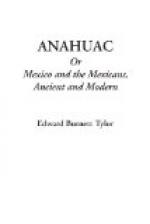it, by one more division, to two and a half.
The President had managed, by desperate efforts, to
borrow some money in Mexico, on the credit of the
State, at sixty per cent.; and it seems certain that
it was this money, judiciously administered to some
of Haro’s generals, that brought about the flight
of the anti-president, and the capitulation of Puebla.
The termination of the affair, according to the newspapers,
was, that the rebel army were incorporated with the
constitutional troops; that their officers—500
in number—were reduced to the ranks for
a term of years; that a hot pursuit was made after
the fugitive Haro; and that, as it was notorious that
the clergy had found the money for the rebellion, it
was considered suitable that they should pay the expenses
of the other side too; and an order was made on the
church-estates of the district to that effect.
Of course, it was an understood thing that the officers
thus degraded would desert at the first opportunity,
and thus the Government would be rid of them.
As for Haro, it is not probable that they ever intended
to catch him; and they were very glad when he disguised
himself in sailor’s clothes, and shipped himself
off somewhere. When the Mexicans first took to
civil wars, the victorious leader used to finish the
contest by having his adversary shot. At the
time of our visit, this fashion had gone out; and the
victor treated the vanquished with great leniency,
not unmindful of the time when he might be in a like
situation himself.
Whether the President ever got much of the forced
contribution from the clergy, I cannot say. At
any rate, they have turned him out since; and for
a very poor government have substituted mere chaotic
anarchy, as Mr. Carlyle would call it. While
the siege was going on, all the commerce between Vera
Cruz and the capital was interrupted, and, of course,
trade and manufacturing felt the effects severely.
Nothing shews the capabilities of the country more
clearly than the fact that, in spite of its distracted
state and continual wars, its industrial interests
seem to be gaining ground steadily, though very slowly.
The evil of these ceaseless wars and revolutions is
not that great battles are here fought, cities destroyed,
and men sacrificed by thousands. Perhaps in no
country in the world are “decisive victories,”
“sanguinary engagements,” “brilliant
attacks,” and the like, got over with less loss
of life. Incredible as it may seem to any one
who knows how many civil wars and revolutions occur
in the history of the country for the last four or
five years, I should not wonder if the number of persons
killed during that time in actual battle was less than
the number of those deliberately assassinated, or
killed in private quarrels.




